|
e-waste management in Sri LankA:
Private sector to the rescue
By L.S. Ananda WEDAARACHCHI
|
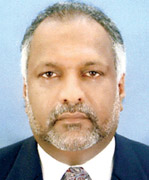
Nalin S. Gunaratna
|
The haphazard manner of discarding electronic waste which is
detrimental to the environment should be stopped. The waste could be
given to collecting institutions for recycling, waste management
specialist Nalin S. Gunaratna said.
The Sunday Observer interviewed Gunaratna on electronic waste
management and environmental hazards.
Q: What does e-waste stand for?
A: People use various electronic items such as hand phones, air
conditioners, radios, television sets, refrigerators, CDs, tapes,
telephones which have a limited life span. People discard these items in
a haphazard manner in landfills and water bodies.
Q: What is its impact on the environment?
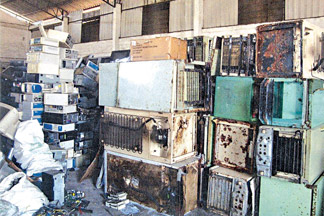 |
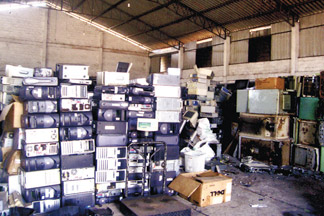
e-waste warehouse at Wattala |
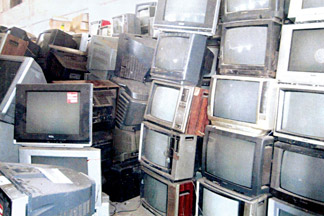
e-waste |
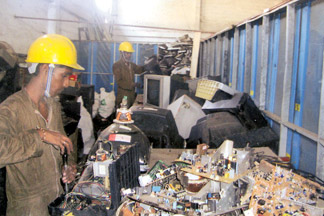 |
| Dismantling e-waste items |
A: E-waste found in landfills, wastelands water bodies or when is
buried cause severe damage to the environment, most of them are
non-degradable and it takes a long time sometimes hundred of years to
disintegrate. Some items generate a toxin poisonous liquid which
contaminates with virgin soil and water beds. When burnt, heavy metals
such as lead, cadmium and mercury in e-waste are released into air and
deposited as ashes. Mercury released into the atmosphere can
bio-accumulate in the food chain particularly in fish.
Q: What are the uses of e-waste?
A: Developed countries in Europe and Asia have set up modern waste
management centres with a network of waste collection centres. In Sri
Lanka under the guidance of Environment and Natural Resources Ministry
the public and private sector organisations had set up a waste
management project.
Geo-Cycle Sri Lanka, a member of the Holcim group is one such
organisation. It has provided professional waste management solutions to
many industries to dispose of its hazardous waste.
The Geo-Cycle's State-of-the-art analytical laboratory provides
analytical reports on conventional and waste derived fuels.
This laboratory awarded the ISO 17025 certificate has been listed as
a competent laboratory of the Central Environmental Authority.
Co-processing, a method used by Geo-Cycle for waste disposal is
globally accepted as the best system to dispose hazardous waste.
It is technically superior to existing systems such as incineration
where residue will not be left out. Co-processing is recognized and
encouraged by international institutions such as the World Health
Organization the World Business Council for sustainable development,
Hazardous Chemical and Waste Convention, Basel Convention, European
Cement Association and German Technical Corporation.
Q: How do you evaluate the garbage and waste collection and recycling
system in Sri Lanka.
A: It was due to the combined efforts of the government, Private
Sector organisations, united Nations and NGOs that the waste management
sector was developed over the years.
The Colombo city garbage collection and disposal system had shown a
remarkable improvement during the past few years.
There is room for improvement. At present much attention should be
taken to provinces.
A systematic garbage collection and recycling system should be
implemented for the whole country.
Q: What are the main activities of your organization, Green Link
Lanka in e-waste management?
A: Sri Lanka imports over three and half tonnes of CDs annually
according to the Department of Customs.
Sri Lanka has over 15 million mobile phone users. In addition cell
phone batteries and spare parts, bulbs, and wires TV sets, TV spare
parts and hundreds of electronic items are also imported. It is still
not known as to how they destroy the CDs which contain deadly mercury
and other chemical coatings.
Our organization with the assistance of Singer Sri Lanka maintains an
islandwide network to collect electronic waste used Hibrid batteries
also will be collected under a agreement with Stafford motors, agent for
Honda vehicles.
Waste is stored at our main warehouse in Wattala. The e-waste is
sorted by our organization which is an authorised venture by the Central
Environmental Authority (CEA) and the UN BASEL Convention.
Last year 4,000 metric tonnes of e/waste were exported to China and
Malaysia where they were recycled.
Sri Lanka does not have such e-waste recycling facilities. E-waste
such as used TV sets, used batteries or cell phones should not be
re-sold. Most of the buyers dismantle them for spare parts dumping
unused parts in waste lands.
An incident in which several members of a family had fallen sick
after being exposed to mercury and led while trying to dismantle a
television set was reported from Wattala.
Parents should not allow children to play with discarded electronic
devices as they could be exposed to the dangerous chemicals. When people
are exposed to chemicals from e/waste it could damage the brain and
nervous system and affect the kindneys and liver and cause birth defects
in children to born.
Q: Should not awareness on systematic e-waste be erected since are
not aware of its harmful effects on health?
A: Yes, such an awareness campaign is vital. The media specially the
electronic media has a vital role to play. Though there are many
advertisements on electronic items there are no awareness campaigns on
e-waste management. |

